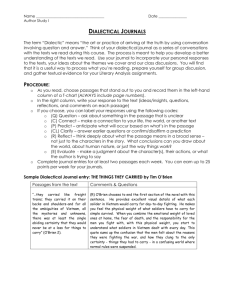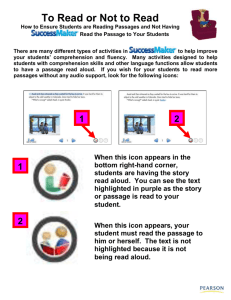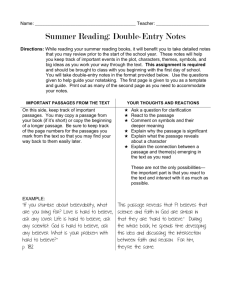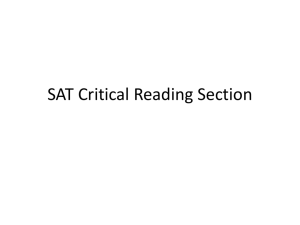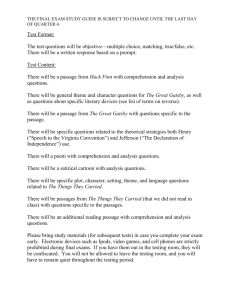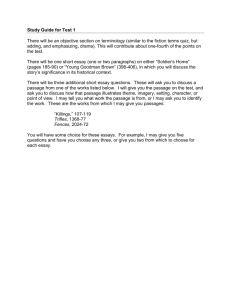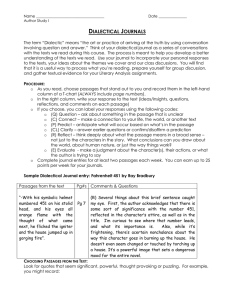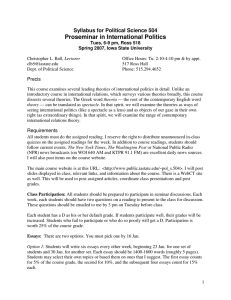catcher in the rye
advertisement
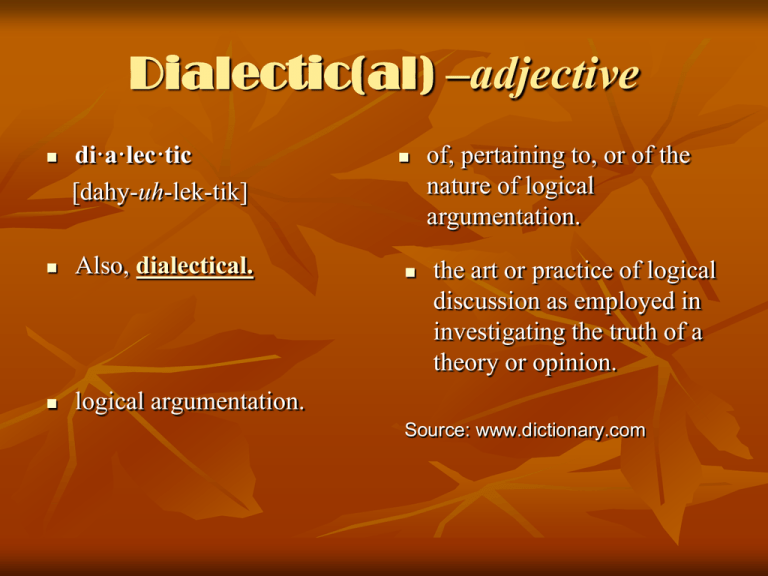
Dialectic(al) –adjective di·a·lec·tic [dahy-uh-lek-tik] Also, dialectical. logical argumentation. of, pertaining to, or of the nature of logical argumentation. the art or practice of logical discussion as employed in investigating the truth of a theory or opinion. Source: www.dictionary.com Dialectic Journal 1. 2. 3. You will choose a significant passage from the text. You will quote the text exactly as it appears in the left column of your journal. Always include page number. In the right column, write a thoughtful response to the quoted text Sample Text Selection from The Things They Carried b y Tim O’Brien “…they carried like freight trains; they carried it on their backs and shoulders-and for all the ambiguities of Vietnam, all the mysteries and unknowns, there was at least the single abiding certainty that they would never be at a at a loss for things to carry” (p 2). Sample Dialectic Response O’brien chooses to end the first section of the novel with this sentence. By comparing it to a freight train, he makes you feel the physical weight of what soldiers have to carry for survival. When you combine the emotional weight of loved ones at home, the fear of death, and the responsibility for the men you fight with, with the physical weight of their packs, you start to understand what the soldiers in Vietnam dealt with every day. This quote sums up the confusion that the men felt about the reasons they were fighting the war, and how they clung to the only certainty – the things they had to carry – in a confusing world where normal rules were suspended. Choosing Passages powerful, thought provoking, or puzzling Look For: Structural shifts or turns in the plot Effective &/or creative use of stylistic or literary devices Passages that remind you of someone or something A passage that makes you realize something you hadn’t seen or considered before When choosing passages, also consider: Examples of patterns: recurring images, ideas, colors, symbols, or motifs Passages with confusing language or unfamiliar vocabulary Events you find surprising or perplexing Passages that illustrate a particular character or setting Responses Should: (Q) Question something in the passage that is unclear (C) Connect to your life, the world, or another text (P) Predict or anticipate what will occur based on what is in the passage (CL) Clarify or answer earlier questions or confirm/disaffirm a prediction you made earlier Or, your responses could do one of the following: (R) Reflect deeply about what the passage means in a broad sense – not just to characters. What conclusions can you draw about the world, human nature, or just the way things work? (E) Evaluate or judge the character(s), their actions, or what the author is trying to say Check out this example from The Ox-Bow Incident by Walter Van Tilburg Clark “The old man and the Mex were dead at the fall, and just swung and spun slowly. But young Tetly didn’t cut. His horse just walked out from under, letting Martin slide off and dangle, choking to death, squirming up and down like an impaled worm, his face bursting with compressed blood” (p 186). A Response: I can’t believe that they actually killed the three men. They had no evidence to prove that they were guilty and yet they murdered those three men in cold blood. It’s hard to believe that some people can have so much disregard for human life. This part of the book makes me think of the death penalty. I used to be in favor of the death penalty because I believed in the saying, an eye for an eye. But sometimes you never know if a person is truly guilty or not. Death is a permanent condition; if you make a mistake, you can’t undo it. Some Sample Sentence Starters: I really don’t understand this because… I think the author is trying to say that… If I were (character) at this point I would… I really dislike/like this idea because… This passage reminds me of a time in my life when… I was surprised when… In this passage, the author successfully shows… Dialectical Journal Due _October 20 Read 4-5 Chapters per week At least one entry every 2 chapters (minimum of 13) At least 50 words each Sporadic journal checks & quizzes Need Rough Draft & Final Typed or Creative Draft Must mark the text using stickie notes (similes, metaphors, responses) * at least 2 per chapter! Sept 9 & 10= Chaps 1 & 2 Sept 14-17= Chaps 3-7 Sept 21-24= Chaps 8-12 Sept 28 –Oct 1= Chaps 13-17 Oct 4-8= Chaps 18-22 Oct 12-15= Chaps 23-26 Oct 20= Journals DUE!! Oct 22or 23= Test?? Oct 26-29= Group Presentations!!!!
